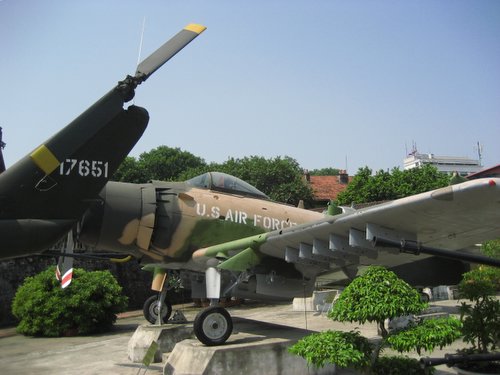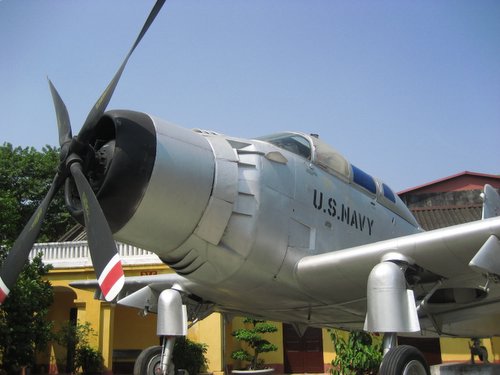TABLE
OF CONTENTS
|
American in Vietnam
Hanoi, Vietnam
By Michelle Cox
I was
wandering around the Vietnamese
Army History
Museum
in Hanoi early Thursday
morning. I had gone with a group of 75
but decided to go off on my own. I was
more interested in learning more about the “American War” than I was
about the
French War so I skipped to the very end of the museum hall. At the bottom of the upstairs to the museum
was a large courtyard with what I thought were just life sized models
of
American War machinery. As I walked on
through and read the plaques in front of each piece, I learned that hey
were
actual American tanks and aircraft from the War that the Viet-Cong had
stolen
from our camps.
 Suddenly, I
became
overwhelmed with emotion. I began to
understand why my mother was so troubled by the fact that I would be
visiting
this place (Vietnam)
that had made such a huge impact on my parents when they were growing
up. All I could do was try to imagine what
it
must’ve been like to be an American soldier and what it must’ve been
like to be
in that very spot hearing the bombs going off around me.
I really wanted to sit there and think long
and hard about it, but I was having such a hard time processing the
information
and concentrating on what I was feeling. I
just couldn’t believe that this peaceful, happy hustle
and bustle
place was once a war zone. I had an even
harder time believing that American soldiers had been killed on the
same
ground I was standing on. And there I
was standing in this courtyard filled with equipment that belonged to
the United States. It made me want to take it all home where it
belongs; it
made me very
angry.
Suddenly, I
became
overwhelmed with emotion. I began to
understand why my mother was so troubled by the fact that I would be
visiting
this place (Vietnam)
that had made such a huge impact on my parents when they were growing
up. All I could do was try to imagine what
it
must’ve been like to be an American soldier and what it must’ve been
like to be
in that very spot hearing the bombs going off around me.
I really wanted to sit there and think long
and hard about it, but I was having such a hard time processing the
information
and concentrating on what I was feeling. I
just couldn’t believe that this peaceful, happy hustle
and bustle
place was once a war zone. I had an even
harder time believing that American soldiers had been killed on the
same
ground I was standing on. And there I
was standing in this courtyard filled with equipment that belonged to
the United States. It made me want to take it all home where it
belongs; it
made me very
angry.
In the midst
of my thoughts, I
realized that across the street there were two older, Vietnamese men
staring at
me as if they were thinking about what I was feeling or what I was
thinking. All I could think about was,
“What if these men were a part of the Viet-Cong? What
if these are the same men that killed
the soldiers of my own country?” At
first I was angry, but not bitter towards any particular thing. I can’t be angry with the Vietnamese because
I wasn’t there at that time. I just
didn’t even know what to do with myself. In
Christina Schwenkel’s article “Recombinant History:
Transnational Practices of Memory and Knowledge Production in
Contemporary Vietnam,” she explains
that some of
the historical attractions left from the war have been depicted as
being “too
real” for the tourists to handle. I
didn’t visit any of the actual bomb sites or the Cu Chi tunnels, which
Schwenkel discusses, but the
amount of emotion that overcame me just from seeing these war artifacts
in Hanoi
was "too real" enough for me. just
didn’t even know what to do with myself. In
Christina Schwenkel’s article “Recombinant History:
Transnational Practices of Memory and Knowledge Production in
Contemporary Vietnam,” she explains
that some of
the historical attractions left from the war have been depicted as
being “too
real” for the tourists to handle. I
didn’t visit any of the actual bomb sites or the Cu Chi tunnels, which
Schwenkel discusses, but the
amount of emotion that overcame me just from seeing these war artifacts
in Hanoi
was "too real" enough for me.
|

Suddenly, I
became
overwhelmed with emotion. I began to
understand why my mother was so troubled by the fact that I would be
visiting
this place (
just
didn’t even know what to do with myself. In
Christina Schwenkel’s article “Recombinant History:
Transnational Practices of Memory and Knowledge Production in
Contemporary Vietnam,” she explains
that some of
the historical attractions left from the war have been depicted as
being “too
real” for the tourists to handle. I
didn’t visit any of the actual bomb sites or the Cu Chi tunnels, which
Schwenkel discusses, but the
amount of emotion that overcame me just from seeing these war artifacts
in Hanoi
was "too real" enough for me.